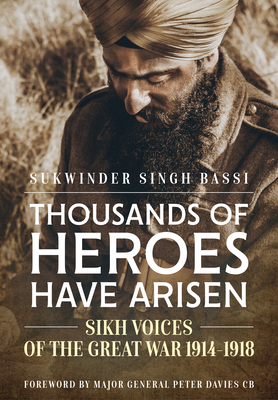Thousands of Heroes Have Arisen: Sikh Voices of the Great War 1914-1918

Thousands of Heroes Have Arisen: Sikh Voices of the Great War 1914-1918
After the annexation of the Punjab in 1849, the British were quick to acknowledge the fighting prowess of the proud Sikh nation and started to recruit Sikhs into the British Indian army. This soldiering tradition continued into the early 20th century and when the Great War commenced in 1914, Sikhs were in high demand. They came forward in their thousands and enlisted in numbers disproportionate to their population. Although they made up approximately 1-2% of the Indian population they made up 20% of the British Indian Army at the beginning of the Great War.
The Great War was truly a global conflict for the Sikhs, who fought in every arena of the war including the Western Front, Gallipoli, Mesopotamia, Persia, Africa, Palestine and the Far East. Their contribution in manpower to the war effort reached over 100,000 men by the end of the conflict. The Great War produced a vast literature of novels, poems and myths. But the story of these Sikh soldiers and the Sikh people is mostly forgotten. This book seeks to address this by telling the story of the Great War through the eyes of the Sikh soldier and Sikh people themselves, by examining their war time experiences from France, from the hospital, from the trench, from the village and an array of lands. The book also tells the story of parallel Sikh movements of the time, from fighting against racism in the Empire to would-be revolutionaries returning from aboard to uproot the British from India. Most fascinatingly, the story is told in their own words by previously anonymous Sikhs such as Gajan Singh, a cavalryman, who tells of the horrors of the Somme in his own unique Indian way, and Mul Singh, who waxes lyrical about the grandeur of England he had encountered on a tour. Poetry from Gurdit Singh exhorting loyalty to a King-Emperor that he had no real knowledge of, and a letter full of emotion and desperation from Partap Kaur, a widow, whose husband had been killed in Flanders.
Their voices are arranged by theme and ordered chronologically to allow the reader to understand how perspectives changed through the course of the war. The book explores many reasons why Sikhs rose to the challenge of fighting in the Great War, and how this is linked to the Sikh psyche, their martial traditions, coercion and to the prevailing situation in the Punjab. Utilizing research from hundreds of unpublished letters written to and from Sikh soldiers, testimonies, newspaper articles, archives and a range of other
PRP: 215.64 Lei
Acesta este Prețul Recomandat de Producător. Prețul de vânzare al produsului este afișat mai jos.
194.08Lei
194.08Lei
215.64 LeiLivrare in 2-4 saptamani
Descrierea produsului
After the annexation of the Punjab in 1849, the British were quick to acknowledge the fighting prowess of the proud Sikh nation and started to recruit Sikhs into the British Indian army. This soldiering tradition continued into the early 20th century and when the Great War commenced in 1914, Sikhs were in high demand. They came forward in their thousands and enlisted in numbers disproportionate to their population. Although they made up approximately 1-2% of the Indian population they made up 20% of the British Indian Army at the beginning of the Great War.
The Great War was truly a global conflict for the Sikhs, who fought in every arena of the war including the Western Front, Gallipoli, Mesopotamia, Persia, Africa, Palestine and the Far East. Their contribution in manpower to the war effort reached over 100,000 men by the end of the conflict. The Great War produced a vast literature of novels, poems and myths. But the story of these Sikh soldiers and the Sikh people is mostly forgotten. This book seeks to address this by telling the story of the Great War through the eyes of the Sikh soldier and Sikh people themselves, by examining their war time experiences from France, from the hospital, from the trench, from the village and an array of lands. The book also tells the story of parallel Sikh movements of the time, from fighting against racism in the Empire to would-be revolutionaries returning from aboard to uproot the British from India. Most fascinatingly, the story is told in their own words by previously anonymous Sikhs such as Gajan Singh, a cavalryman, who tells of the horrors of the Somme in his own unique Indian way, and Mul Singh, who waxes lyrical about the grandeur of England he had encountered on a tour. Poetry from Gurdit Singh exhorting loyalty to a King-Emperor that he had no real knowledge of, and a letter full of emotion and desperation from Partap Kaur, a widow, whose husband had been killed in Flanders.
Their voices are arranged by theme and ordered chronologically to allow the reader to understand how perspectives changed through the course of the war. The book explores many reasons why Sikhs rose to the challenge of fighting in the Great War, and how this is linked to the Sikh psyche, their martial traditions, coercion and to the prevailing situation in the Punjab. Utilizing research from hundreds of unpublished letters written to and from Sikh soldiers, testimonies, newspaper articles, archives and a range of other
Detaliile produsului











